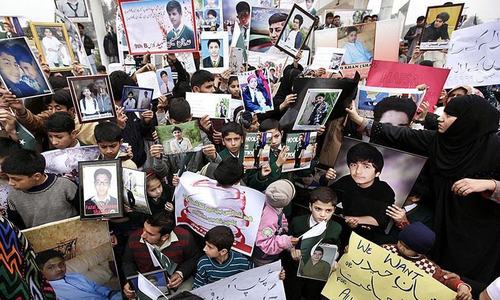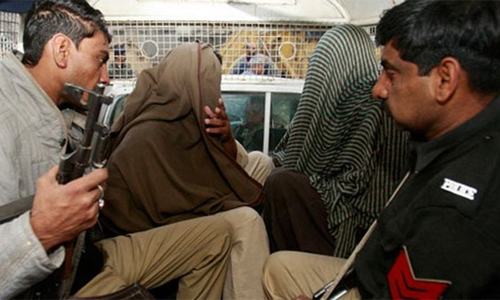ISLAMABAD: After denying for months presence of the militant Islamic State (IS) group in Pakistan, the government has disclosed that it is among the 61 organisations that have been banned in the country.
Minister of State for Interior Baleeghur Rahman informed the Senate during the question hour on Friday that Daesh (the Arabic acronym of IS) had been placed on the list of banned organisations on July 15. This was the only addition to the list made by the government during the last two and a half years.
He said the Al-Khair Trust and Al-Rasheed Trust were enlisted under a United Nations Security Council Resolution. The Jamaat-ud-Dawa (JuD) has been on the list since December 2005.
According to the official list shared with the Senate, Lashkar-i-Jhangvi and Sipah-i-Mohammad Pakistan were placed on the list on Aug 14, 2001 and Jaish-i-Mohammad, Lashkar-e-Taiba or LeT, Sipah-i-Sahaba Pakistan, Tehreek-i-Islami and Tehreek-i-Nifaz-i-Shariat-i-Mohammadi on Jan 14, 2002. Tehreek-i-Jafria Pakistan was put on the list on Jan 28, 2002, followed by Al Qaeda on March 17, 2003, Millat-i-Islamia Pakistan and Khuddamul Islam on Nov 15, 2003 and Islami Tehreek Pakistan on Nov 15, 2003.
Three more organisations — Jamiatul Ansar, Jamiatul Furqan and Hizbut Tehrir — were banned on Nov 20, 2003, and Khair-un-Naas International Trust was banned on Oct 27, 2004.
The Balochistan Liberation Army was placed on the list on April 7, 2006, and Islamic Students Movement of Pakistan on Aug 21, 2006.
Another four groups were banned after a gap of about two years — Lashkar-i-Islam, Ansarul Islam and Haji Namdar Group on June 30, 2008, and Tehreek-i-Taliban Pakistan on Aug 25, 2008.
Al-Khair Trust and Al-Rasheed Trust were enlisted under a UN Security Council resolution. The Jamaat-ud-Dawa has been on the list since Dec 2005
Five militant organisations from Balochistan — Balochistan Republican Army, Balochistan Liberation Front, Lashkar-i-Balochistan, Balochistan Liberation United Front and Balochistan Musallah Difa Tanzeem — were put on the list on Sept 8, 2010.
Three organisations from Gilgit — Shia Tulaba Action Committee, Markaz Sabeel Organisation, Tanzeem Naujawanane Ahle Sunnat — and Peoples Aman Committee (Lyari), Karachi, were placed on the list on Oct 10, 2011.
Ahle Sunnat Wal Jamaat, a reincarnation of Sipah-i-Sahaba Pakistan, was banned on Feb 15, 2012 followed by Al Harmain Foundation and Rabita Trust on March 6, 2012, and Anjuman-i-Imamia and Muslim Students Organisation (both from Gilgit-Baltistan) on April 24, 2012.
Tanzeem Ahle Sunnat Wal Jamaat (Gilgit-Baltistan) appeared on the list on June 5, 2012, while Balochistan Bunyad Parast Army, Tehreek Nafaz-i-Aman, Tahafuz Hadudullah and Balochistan Waja Liberation Army, Islam Mujahideen, Jaish-i-Islam and Balochistan National Liberation Army were banned on Aug 4, 2012.
The list was widely expanded in 2013 with the addition of Khana-i-Hikmat Gilgit Baltistan on March 13 and Tehreek-i-Taliban Swat, Tehreek-i-Taliban Mohmand, Tariq Geedar Group, Abdullah Azam Brigade, East Turkmenistan Islamic Movement, Islamic Movement of Uzbekistan, Islamic Jihad Union, 313 Brigade, Tehreek-i-Taliban Bajaur, Amar Bil Maroof Wa Nahi Anil Munkir (Haji Namdar Group), Baloch Student Organisation-Azad, United Baloch Army and Jeay Sindh Muttahida Mahaz on March 15, 2013.
Since then, the list remained unchanged till July 15, 2015, when the name of the IS was put on it.
Answering a question, the minister confirmed that ban on arms licences was relaxed to facilitate President Mamnoon Hussain’s son and Prime Minister Nawaz Sharif. He said the prime minister had been gifted a weapon, warranting issuance of licence. He said the interior minister had placed ban on issuance of arms licences on June 20, 2013 and had the right to relax the ban.
Some opposition members protested when the reply to a question seeking to know the names of beneficiaries of the now defunct National Reconciliation Ordinance was not provided. But Mr Rahman said the question had been referred to the National Accountability Bureau and the reply would shortly be received.
Later, as many as 33 names were called to take part in discussion on the president’s address to the joint sitting of the parliament, but most of them were either absent or not inclined to speak. Only six members took part in the discussion on the matter.
Published in Dawn, December 19th, 2015














































